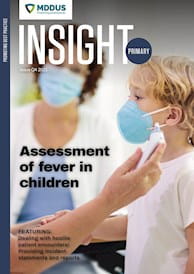These case summaries are based on MDDUS files and are published here to highlight common pitfalls and encourage proactive risk management and best practice. Details have been changed to maintain confidentiality.
BACKGROUND
Ms G attends her GP, Dr A, complaining of abdominal pain. The 36 year old, who has recently given birth to her seventh child, agrees to undergo a gynaecological examination, which is carried out in the presence of a chaperone.
During the procedure, Dr A talks through what he is doing, including the type of equipment he is using. He reassures Ms G that it won’t take long and goes on to explain his findings once the examination is complete. Ms G is given a prescription and follow-up advice.
FOUR DAYS LATER
The practice receives a letter of complaint from Ms G regarding her recent appointment with Dr A. She explains that, during the intimate examination, the GP commented on the fact she had seven children, and how that meant “I’ll need to find a large speculum”.
Ms G says the comment made her feel very self-conscious and uncomfortable, adding that she thought it very unprofessional for the doctor to make such a personal remark about her body. She adds that she no longer wishes to consult with Dr A as she does not feel comfortable with him.
ANALYSIS/OUTCOME
Dr A contacts MDDUS for advice on drafting a response to Ms G. He tells the medico-legal adviser (MLA) he had never intended to offend Ms G but now realises that such a comment could cause upset. He says he will take more care in future as to his choice of language when speaking to patients, particularly during an intimate examination.
The MLA recommends that Dr A starts his response by acknowledging receipt of the complaint, inserting an expression of regret to the patient for her experience, confirming that her concerns are being taken seriously and detailing the investigation that has taken place.
For example, he could state that he is sorry to hear of the upset the patient has felt about the language he used and would like to thank her for bringing it to his attention. He could then assure her the concerns she has raised have been taken very seriously and in order to investigate them he has, for example, reviewed the medical records, recalled their consultation from memory and discussed this matter with the chaperone.
This can then be followed by an expression of regret that the language he used caused the patient distress, including any reflections Dr A has since made regarding his use of language.
The MLA advises that it would be appropriate to say sorry for the harm he has caused Ms G, and describe how he plans to adapt his future practice to prevent a repeat of the incident. The MLA advises Dr A that a complaint response should usually conclude with a statement along the lines of: “I do hope this letter addresses the concerns you have raised to your satisfaction.”
The doctor could then offer to meet the patient to discuss the matter further, if she thinks this would be helpful. He should then add a final sentence explaining Ms G’s right to contact the ombudsman (providing contact details) if she remains dissatisfied.
Following the telephone advice, Dr A drafts a complaint response and sends it to the MLA for review. The final version is sent to Ms G and the matter is taken no further.
KEY POINTS
- Be mindful of your choice of language when speaking to patients about their physical condition, particularly during the course of an intimate examination.
- A swift and carefully written response – including an apology where appropriate – is often enough to resolve a patient complaint.
- MDDUS advisers are on hand to assist in the drafting of complaint responses.
This page was correct at the time of publication. Any guidance is intended as general guidance for members only. If you are a member and need specific advice relating to your own circumstances, please contact one of our advisers.
Read more from this issue of Insight Primary

Save this article
Save this article to a list of favourite articles which members can access in their account.
Save to library
